
Usmar Ismail was an Indonesian film director, author, journalist and revolutionary of Minangkabau descent. He is widely regarded as the native Indonesian pioneer of the cinema of Indonesia.
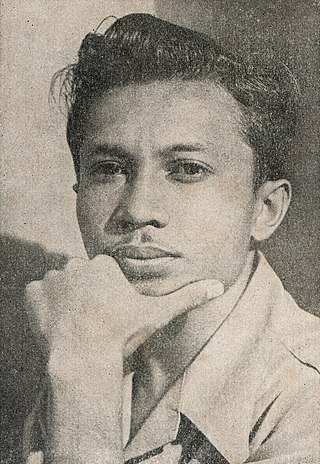
Asrul Sani was an Indonesian writer, poet and screenwriter.
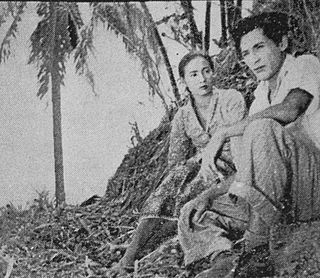
Embun is a 1952 film directed by D. Djajakusuma for Perfini in his directorial debut.
The Citra Award for Best Picture is an award given at the Indonesian Film Festival (FFI) to the best feature film of the year. The Citra Awards, described by Screen International as "Indonesia's equivalent to the Oscars", are the country's most prestigious film awards and are intended to recognize achievements in films as well as to draw public interest to the film industry.

Sinematek Indonesia, or Sinematek for short, is a film archive located in Jakarta. Established in 1975 by Misbach Yusa Biran and Asrul Sani, the archive was the first in Southeast Asia, and remains the only one in Indonesia. It is home to roughly 2,700 films, mostly Indonesian, and also houses numerous reference works. Since 2001 it has been underfunded.

Djadoeg Djajakusuma was an Indonesian film director and promoter of traditional art forms. Born to a nobleman and his wife in Temanggung, Central Java, Djajakusuma became interested in the arts at a young age, choosing to pursue a career in theatre. During the Japanese occupation from 1943 to 1945 he was a translator and actor, and in the four-year national revolution which followed he worked for the military's educational division, several news agencies, and in drama.

Abisin Abbas, better known by his pseudonym Andjar Asmara, was a dramatist and filmmaker active in the cinema of the Dutch East Indies. Born in Alahan Panjang, West Sumatra, he first worked as a reporter in Batavia. He became a writer for the Padangsche Opera in Padang, where he developed a new, dialogue-centric style, which later spread throughout the region. After returning to Batavia in 1929, he spent over a year as a theatre and film critic. In 1930 he joined the Dardanella touring troupe as a writer. He went to India in an unsuccessful bid to film his stage play Dr Samsi.

Tjambuk Api is a 1958 Indonesian martial arts film directed by D. Djajakusuma and produced by Usmar Ismail. Starring Bambang Irawan, Aminah Cendrakasih, Soekarno M. Noer, and Rendra Karno, it tells of a young villager who must challenge a local criminal to be with his love. The film underwent several modifications over a period of more than a year before it could pass the censorship board, but now remains one of Djajakusuma's better known works.

Darah dan Doa is a 1950 Indonesian war film directed and produced by Usmar Ismail, telling the story of the Siliwangi Division and its leader Captain Sudarto on a march to West Java. Following Ismail's Dutch-produced Tjitra (1949), Darah dan Doa is often cited as the first 'Indonesian' film, and the film's first day of shooting – 30 March – is celebrated in Indonesia as National Film Day.

Enam Djam di Jogja is a 1951 Indonesian film directed by Usmar Ismail. It was the second film to be produced under the PERFINI banner. Detailing the show of force in which the Indonesian republican army retook the capital at Yogyakarta for six hours, the film utilised much of the cast and crew from Ismail's previous work Darah dan Doa (1950). The film was a success in Indonesia and continued to be screened on the state television channel into the 1980s, even after two further films about the event were released.

Lilik Sudjio was an Indonesian actor turned film director who won the Citra Award for Best Director in 1955 for his film Tarmina. He was involved in 74 feature film productions since his debut in Fred Young's Saputangan in 1949.

The Citra Award for Best Actor is an award given at the Indonesian Film Festival (FFI) to Indonesian actors for their achievements in leading roles. The Citra Awards, described by Screen International as "Indonesia's equivalent to the Oscars", are the country's most prestigious film awards and are intended to recognize achievements in films as well as to draw public interest to the film industry.

Tarmina is a 1954 Indonesian film directed by Lilik Sudjio. It stars Fifi Young, A. Hadi and Endang Kusdiningsih. It received five awards at the first Indonesian Film Festival in 1955, including Best Film, Best Director for Lilik Sudjio, Best Leading Actor for A. Hadi, Best Leading Actress for Fifi Young, and Supporting Actress for Endang Kusdiningsih.
Djaoeh Dimata is a 1948 film from what is now Indonesia written and directed by Andjar Asmara for the South Pacific Film Corporation (SPFC). Starring Ratna Asmara and Ali Joego, it follows a woman who moves to Jakarta to find work after her husband is blinded in an accident. SPFC's first production, Djaoeh Dimata took two to three months to film and cost almost 130,000 gulden.

Dhalia was an Indonesian actress active for over fifty years. She was nominated for three Citra Awards at the Indonesian Film Festival, winning one.
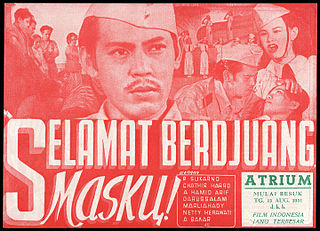
Selamat Berdjuang, Masku! is a 1951 Indonesian film directed by R.H. Andjar Subyanto and starring Raden Sukarno and Marlia Hardi. It follows a former guerrilla leader who must pursue his love despite the interference of his former comrades.
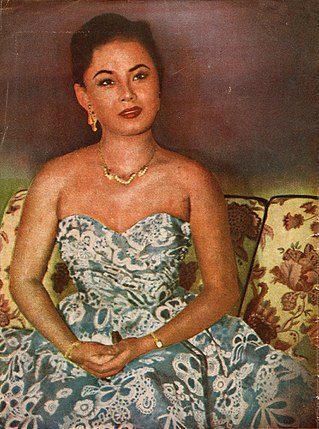
Netty Herawaty was an Indonesian actress who made more than fifty films between 1949 and 1986.

Darussalam was an Indonesian actor who appeared in more than seventy films in his forty-year career. Born in Bengkulu, he studied to be nurse before migrating to theatre during the Japanese occupation of the Dutch East Indies, marrying Netty Herawaty while with the troupe Irama Masa. The couple spent the remainder of the occupation and the ensuing revolution touring the archipelago with a number of troupes. In 1949, Darussalam and Herawaty made their feature film debut in Fred Young's Saputangan, appearing in seven further Young productions before migrating to Djamaluddin Malik's Persari. During their eight years with the company, Darussalam and Herawaty travelled to the Philippines and Singapore and found popularity among audiences, though Darussalam remained in his wife's shadow.

Tiga Dara is a 1957 Indonesian musical drama film starring Chitra Dewi, Mieke Wijaya, and Indriati Iskak. Directed by Usmar Ismail for Perfini, the film follows three sisters who live with their father and grandmother. When the eldest sister, Nunung, shows no interest in marrying, her family tries unsuccessfully to find a husband for her. Nunung initially rejects the advances of a young man named Toto, who instead dates her younger sister. However, when he becomes jealous and travels from Jakarta to Bandung to profess his love, she agrees to marry him.
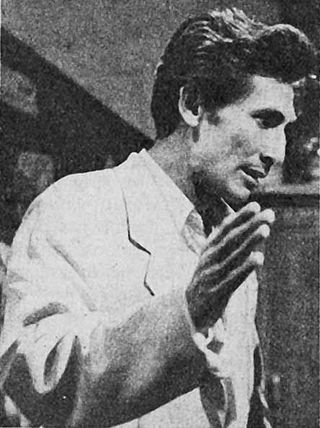
Achmad Nungcik Alcaff was an Indonesian actor and film director who won the Citra Award for Best Leading Actor at the 1955 Indonesian Film Festival.



















